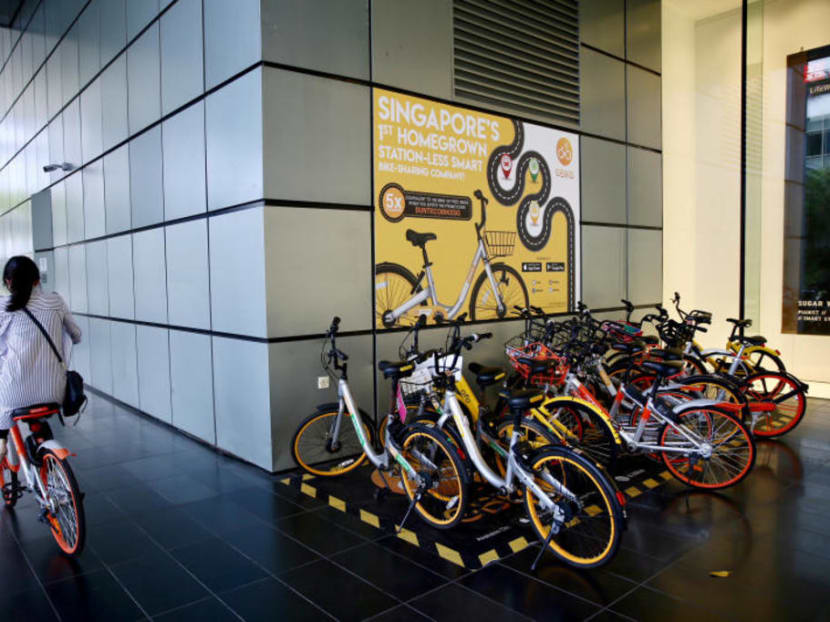Shared bike fleet slashed by over 50% to 40,500, as Ofo cuts numbers from Nov 1
SINGAPORE — The shared bicycle population in Singapore will be cut by more than half next month, dipping from 100,000 in September to 40,500 as operators downsize their fleets to meet a Nov 1 deadline imposed by the Land Transport Authority (LTA).

The number of shared bicycles in Singapore will be reduced by more than half under a new licensing regime, as the authorities announced that six bicycle-sharing operators have been granted licences.
SINGAPORE — The shared bicycle population in Singapore will be cut by more than half next month, dipping from 100,000 in September to 40,500 as operators downsize their fleets to meet a Nov 1 deadline imposed by the Land Transport Authority (LTA).
Five out of the six bike-sharing firms which were granted licences to operate in Singapore have accepted the maximum fleet sizes granted to them, said the LTA in a media release on Monday (Oct 29).
China-based company Ofo, which was allowed to have a fleet of 25,000 bicycles, later requested to reduce that number to 10,000. Ofo had initially said that it needed 80,000 bicycles to support the demand for first- and last-mile commutes here, before making its latest U-turn.
The LTA said that Ofo had informed the authority this month that it had difficulties meeting its financial obligations under the licensing scheme for 25,000 bikes, and had made the request to LTA to cut down its fleet, which was granted.
Bike-sharing operators with full licences here have to pay S$60 per bicycle, of which S$30 is the annual licence fee, and S$30 for a two-year refundable security deposit. Those with sandbox licences need only fork out S$12 per bike annually in licencing fee.
In Ofo’s case, its initial allocation of 25,000 bikes would have cost the firm S$1.5 million annually, with the reduced size of 10,000 now costing it S$600,000.
"In response to the new licensing regime, Ofo has made the business decision to license and operate 10,000 bikes in Singapore as a strategic step to adapt to the set of measures implemented by LTA," Ms Isabelle Neo, Country Manager, Ofo Singapore, said in response to queries from TODAY.
The firm added that it would try its best to meet the Nov 1 deadline of having a reduced fleet.
With Ofo bringing its fleet numbers down to 10,000, China-based firm Mobike will be the largest operator of shared bicycles here with its 25,000 maximum fleet limit.
SG Bike, which previously had 2,200 bicycles, will be the third largest operator with 3,000 bicycles.
LTA said in its statement that all six bicycle sharing firms, which were granted permits on Sept 28, have paid for their licences.
The authority added that it would “consider imposing regulatory sanctions on any licensee which fails to meet its maximum fleet size”. These sanctions may include financial penalties of up to S$100,000 for each non-compliance of licensing conditions, reductions in fleet size, suspension or termination of licences.
Fleet sizes of the operators would also be regularly reviewed, taking into account factors such as the firms’ performance and user demand, added the LTA. The next round of applications for operators to apply for new licences or fleet size increases will open in January next year.
Ofo's Ms Neo said the company "looks forward to applying for the licence to increase our fleet size" then.
The LTA confirmed in its release on Monday that three other companies without a track record of operating shared bicycles here were granted sandbox licences. They are homegrown player Anywheel, ride-hailing firm Grab’s bicycle-sharing marketplace GrabCycle, and Chinese firm Qiqi ZhiXiang.
Anywheel, which had a fleet of more than 1,000, and GrabCycle will be limited to just 1,000 bicycles. Qiqi ZhiXiang will be the smallest operator with 500 bicycles.
A Grab spokesperson said the company is pleased to receive the sandbox licence, which will allow it "to expand our suite of affordable transport offerings, bringing us closer to our multi-modal vision."
Full licenses are valid for two years, while sandbox licenses have to be renewed every year.
LTA said last month that it will monitor the performances of these newer operators before deciding whether to grant them full licences.






